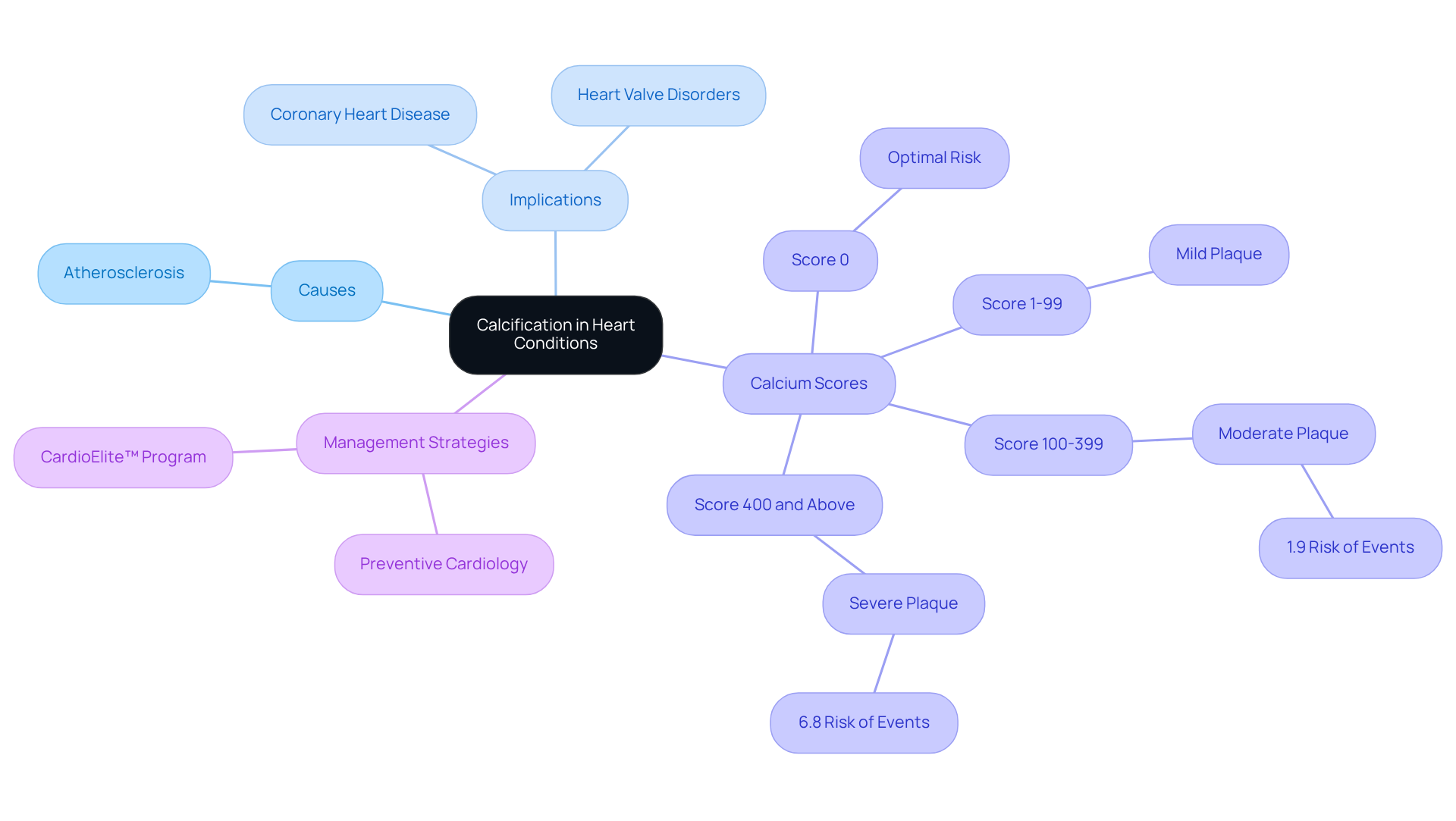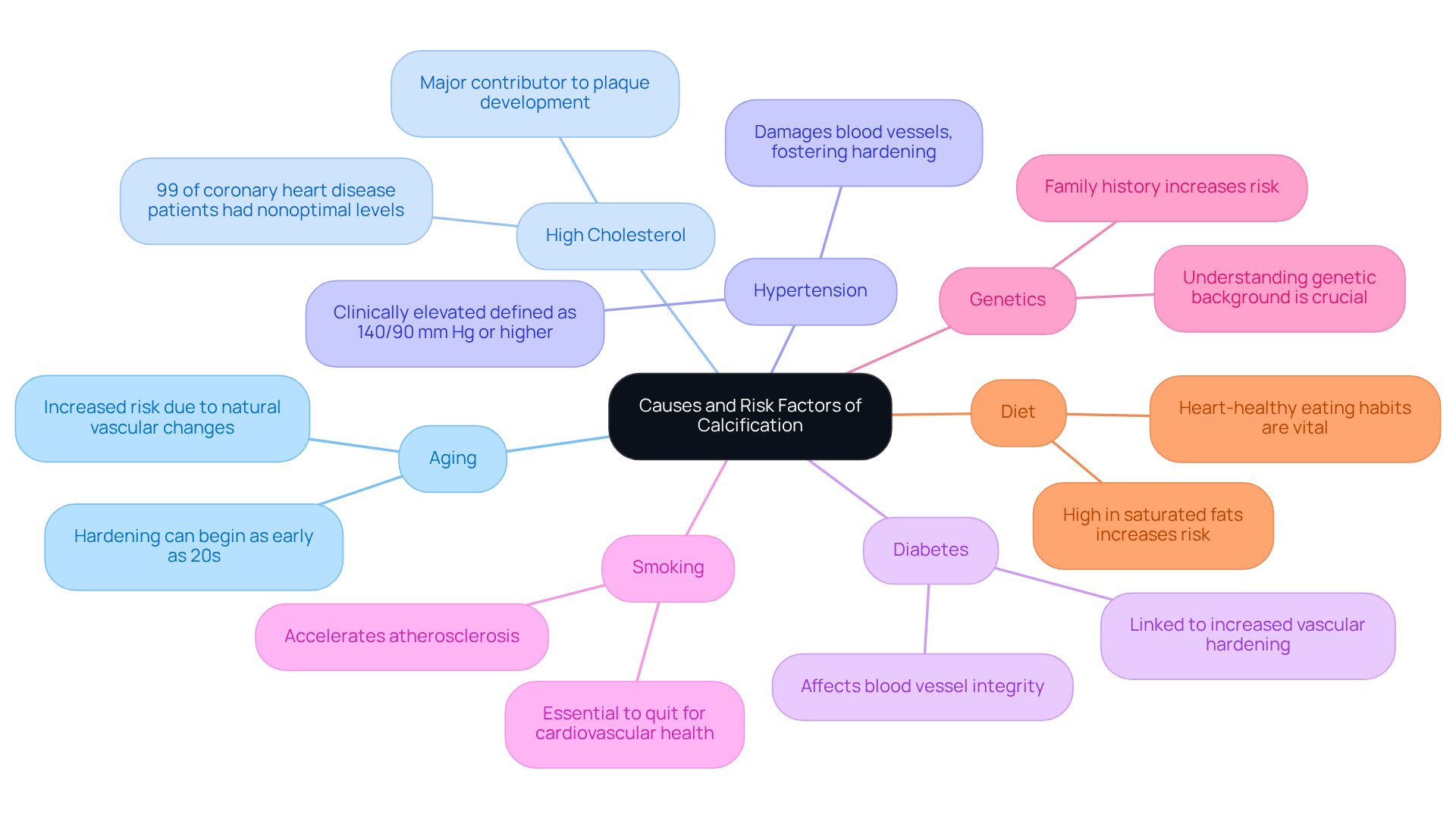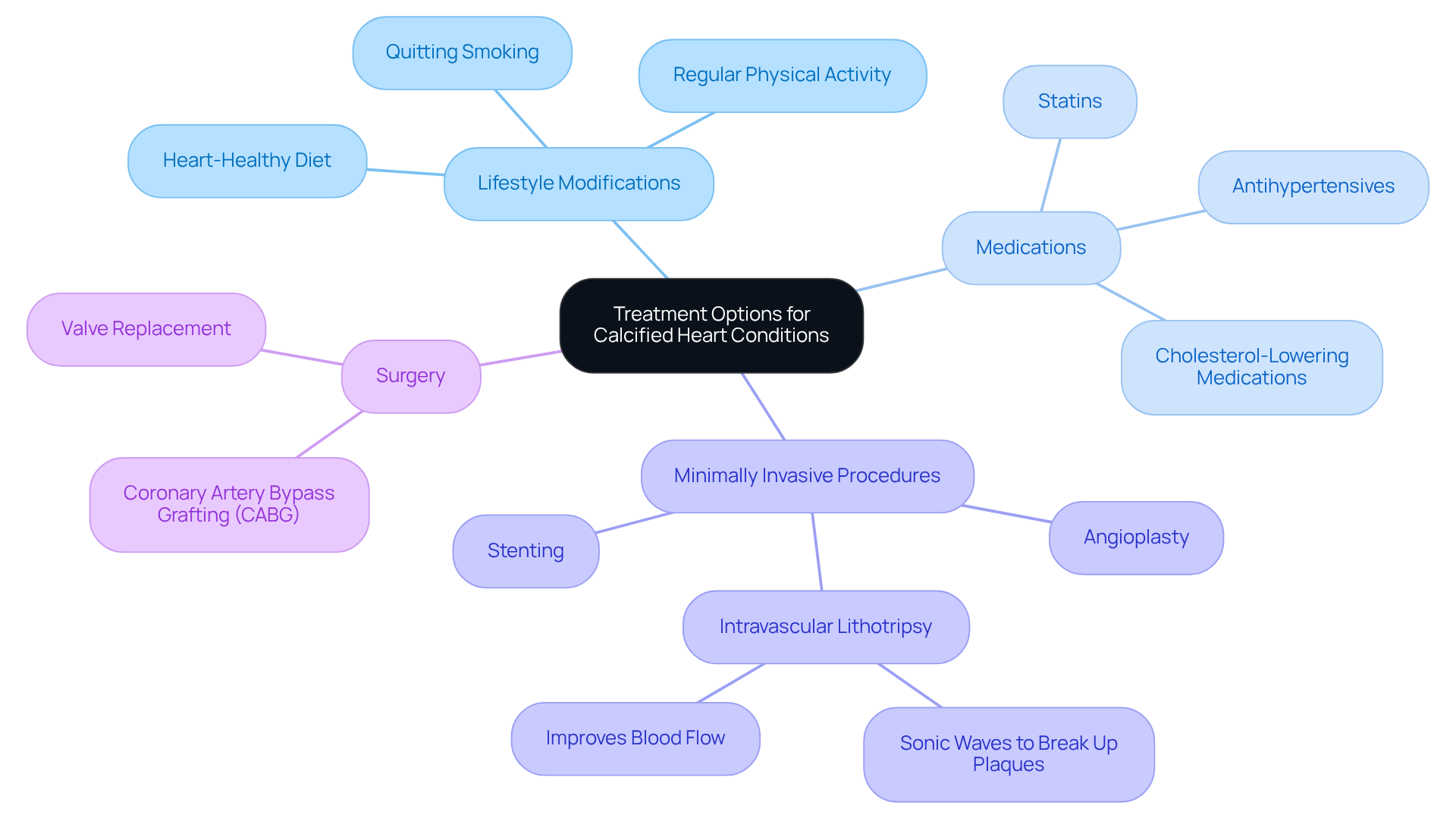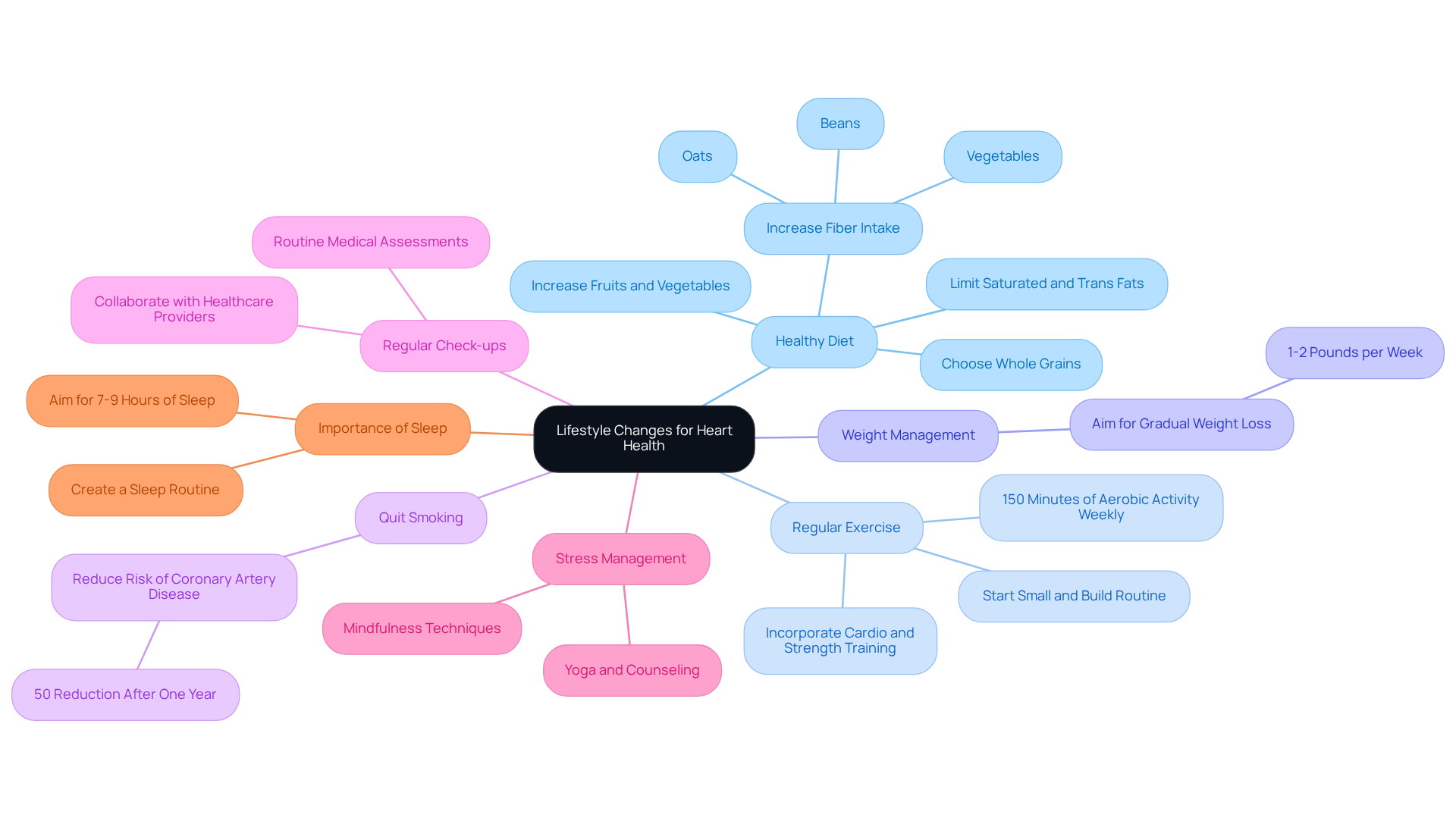


Calcification in heart conditions can be concerning, as it primarily stems from the accumulation of calcium deposits in the coronary vessels and cardiac valves. This buildup can lead to stiffening and narrowing, which may obstruct circulation and heighten the risk of serious cardiovascular diseases.
Several factors contribute to this condition, including:
It's crucial to understand that lifestyle modifications and medical interventions can play a significant role in managing and preventing calcified heart issues effectively.
Have you considered how your daily habits might impact your heart health? Making small changes can lead to meaningful improvements. It’s important to remember that you are not alone in this journey. Support is available to help you navigate these challenges.
By prioritizing your health and seeking guidance, you can take proactive steps towards a healthier heart. Together, we can work towards reducing the risks associated with calcification and enhancing your overall well-being. Remember, every effort counts, and reaching out for help is a sign of strength.
Calcification in heart conditions poses a significant threat to cardiovascular health, often leading to serious complications such as coronary artery disease and heart valve disorders. It's important to recognize that these issues can be concerning, especially for older adults who may feel anxious about their health. This article delves into the causes, treatment options, and preventive measures associated with calcified heart conditions, offering you valuable insights into managing your heart health.
As the prevalence of these conditions rises, understanding how mineral deposits affect the heart becomes increasingly critical. In addition to this, it’s essential to explore what strategies you can adopt to mitigate these risks and enhance your cardiovascular well-being. Remember, you are not alone in this journey; support and resources are available to help you navigate these challenges.
Calcification in cardiac conditions refers to the accumulation of calcium deposits within the tissues of the calcified heart, particularly affecting the coronary vessels and cardiac valves. This buildup can lead to the stiffening and narrowing of blood vessels, significantly obstructing circulation and increasing the risk of serious cardiovascular issues, such as coronary heart disease (CAD) and heart valve disorders. Often resulting from atherosclerosis, calcification occurs when fatty deposits in the arteries undergo changes over time. This process is especially concerning for older adults, who may be more vulnerable to these changes due to age-related factors.
At Amavita Heart and Vascular Health®, we emphasize the importance of comprehensive cardiac evaluations, which include advanced imaging and testing, to effectively assess and address these challenges. Our preventive cardiology strategy combines advanced evaluation tools with personalized interventions, such as lifestyle changes and minimally invasive therapies tailored to your specific condition. Recent studies indicate that coronary artery hardening (CAC) is a strong predictor of cardiovascular events. For instance, a calcium score of 400 or above is linked to a 6.8% chance of significant adverse cardiovascular events, while scores between 1 and 399 suggest a notably lower likelihood of 1.9%. A calcium score of zero is considered optimal, indicating no mineral deposits and a very low risk of cardiovascular incidents. These findings highlight the importance of monitoring calcium levels in the arteries, particularly in the elderly population, where conditions related to a calcified heart are common.
Real-world examples illustrate the impact of mineral deposits on health. Individuals with significant hardening often experience symptoms such as chest pain and shortness of breath, which can lead to more serious complications if not addressed. Understanding the implications of mineral deposits is crucial for effective management and treatment strategies, especially as the population ages and the prevalence of cardiovascular diseases rises. Our CardioElite™ program enhances cardiac care by providing advanced, real-time diagnostic data and 24/7 cardiology consultation, ensuring proactive management of cardiac patients and reducing the likelihood of readmissions.
In summary, recognizing the role of mineral deposit formation in coronary vessels and heart valves is vital for assessing cardiovascular health. With ongoing research shedding light on the processes and risks associated with mineral buildup, healthcare providers at Amavita can better tailor interventions to improve outcomes for at-risk patients. As noted by Federico Biavati, "Coronary artery calcium is a strong and independent predictor of cardiovascular events," underscoring the critical need for monitoring and timely intervention.

Calcification in heart conditions can lead to a calcified heart, which may arise from various causes and risk factors, and understanding these can empower you to take charge of your heart health. Here are some important factors to consider:
Recognizing these factors is crucial, especially for seniors, as it allows for proactive management of cardiovascular health. Remember, you are not alone in this journey—support is available, and taking steps now can lead to a healthier future.

Treatment alternatives for conditions related to a calcified heart are tailored to meet individual needs based on the severity of mineralization and the specific cardiovascular issues at play. Understanding these options is essential for patients and caregivers, as it empowers them to make informed choices about their cardiovascular health.
We understand that navigating these treatment alternatives can be overwhelming. However, know that you are not alone on this journey. Our team is here to support you every step of the way, ensuring you feel informed and cared for as you take charge of your cardiovascular wellness.

To effectively prevent and manage calcified heart conditions, individuals can adopt several impactful lifestyle changes and preventive measures:
Healthy Diet: Prioritize a diet abundant in fruits, vegetables, whole grains, and lean proteins while minimizing saturated fats, trans fats, and sodium. Increasing fiber intake from foods like oats, beans, and vegetables is crucial for lowering cholesterol. This approach not only lowers cholesterol but also helps maintain a healthy weight and control blood pressure.
Regular Exercise: Engage in at least 150 minutes of moderate-intensity aerobic activity weekly. Activities such as walking, cycling, and swimming can significantly enhance cardiovascular health and overall well-being. Incorporating both cardio and strength training exercises maximizes cardiovascular health benefits. Starting with small, manageable sessions can help build a consistent routine.
Weight Management: Maintaining a healthy weight is essential, as being overweight raises the likelihood of conditions that can lead to a calcified heart. Aim for gradual weight loss of about 1-2 pounds per week through a balanced diet and regular exercise.
Quit Smoking: Stopping smoking significantly lowers the chances of cardiovascular disease. Within only one year of quitting, the chance of coronary artery disease is reduced by fifty percent, highlighting the prompt advantages of this lifestyle change.
Regular Check-ups: Routine medical assessments are crucial for overseeing cardiovascular well-being and efficiently handling contributing factors. At Amavita Heart and Vascular Health®, our thorough cardiac assessments assist in recognizing factors early, enabling collaboration with healthcare providers to develop customized treatment plans that meet individual requirements.
Stress Management: Implementing stress-reduction techniques such as mindfulness, yoga, or counseling can significantly benefit cardiovascular health. Persistent stress is associated with elevated blood pressure and cardiovascular disease likelihood, rendering stress management an essential aspect of cardiovascular care.
Importance of Sleep: Aim for 7-9 hours of rest each night, as sufficient sleep is crucial for cardiovascular well-being. Persistent lack of sleep is associated with heightened risks of high blood pressure, inflammation, and weight gain, all contributing to cardiovascular disease.
By integrating these changes into daily life, seniors can make substantial strides in improving their heart health and overall quality of life, supported by Amavita's commitment to personalized cardiac care.

Calcified heart conditions can pose significant challenges to cardiovascular health, primarily due to calcium deposits that accumulate in the heart's tissues. Understanding the implications of these deposits is crucial for effective management and treatment. It is essential to recognize calcification as a serious health concern, particularly for older adults, and to appreciate the need for comprehensive evaluations and personalized interventions to mitigate risks.
What causes calcification? Various factors contribute to this condition, including:
Fortunately, there are treatment options available, ranging from lifestyle modifications and medications to minimally invasive procedures and surgical interventions. Each of these approaches plays a vital role in managing and potentially reversing the effects of calcified heart conditions.
Ultimately, adopting preventive measures and making informed lifestyle changes can significantly enhance heart health and overall well-being. We encourage individuals to take proactive steps—such as maintaining a heart-healthy diet, engaging in regular exercise, and managing stress—to reduce the risk of calcification. By prioritizing cardiovascular health and staying informed about the latest research and treatment options, individuals can empower themselves to lead healthier lives and reduce the prevalence of calcified heart conditions. Remember, you are not alone in this journey, and support is available to help you every step of the way.
What is calcification in heart conditions?
Calcification in heart conditions refers to the accumulation of calcium deposits within the tissues of the heart, particularly affecting the coronary vessels and cardiac valves. This buildup can lead to stiffening and narrowing of blood vessels, obstructing circulation and increasing the risk of cardiovascular issues.
What causes calcification in the heart?
Calcification often results from atherosclerosis, where fatty deposits in the arteries undergo changes over time. Older adults are particularly vulnerable to these changes due to age-related factors.
Why is monitoring calcium levels in arteries important?
Monitoring calcium levels in arteries is crucial because a high calcium score can indicate a significant risk of cardiovascular events. For example, a calcium score of 400 or above is linked to a 6.8% chance of serious adverse cardiovascular events, while a score of zero indicates no mineral deposits and a very low risk.
What symptoms might indicate significant calcification in the heart?
Individuals with significant calcification often experience symptoms such as chest pain and shortness of breath, which can lead to more serious complications if not addressed.
How does Amavita Heart and Vascular Health® approach the assessment of calcification?
Amavita Heart and Vascular Health® emphasizes comprehensive cardiac evaluations that include advanced imaging and testing to assess and address calcification challenges. They combine evaluation tools with personalized interventions, such as lifestyle changes and minimally invasive therapies.
What is the CardioElite™ program?
The CardioElite™ program enhances cardiac care by providing advanced, real-time diagnostic data and 24/7 cardiology consultation, ensuring proactive management of cardiac patients and reducing the likelihood of readmissions.
What is the significance of ongoing research on mineral deposit formation in the heart?
Ongoing research is vital for understanding the processes and risks associated with mineral buildup, which helps healthcare providers better tailor interventions to improve outcomes for at-risk patients.